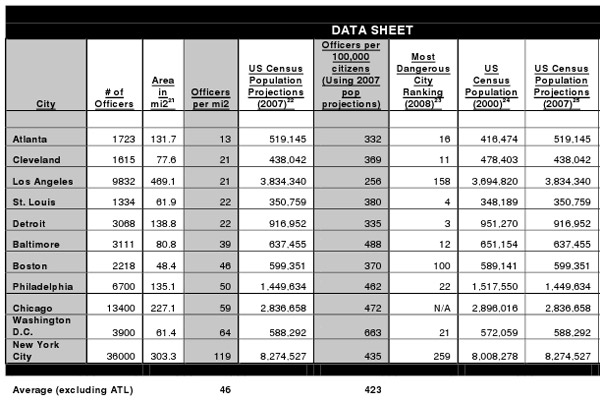.jpg)
Reading an interview with Tracey Meares, something she said jumped out at me, because it's very obvious yet I'd never considered it:
Now, New York City, one story behind the crime drop in New York City is a very heavy investment in lots and lots of cops. There are more cops per square inch, per person, in New York than anywhere else. It's the largest police force in the country. Chicago is second, but it just dwarfs Chicago in absolute numbers, but also in terms of density. Manhattan, you know, tiny; those of you who are from Chicago know, big, spread-out city. Go to L.A., which I think is third, and the density factor, it's not there. So it's even hard to think about comparing these ideas.
It might be that New York achieved a crime drop by investing in lots of police, by basically having a cop standing on every corner waiting in the ready to catch somebody when they break the law or are thinking about breaking the law. That's a way of thinking about achieving crime reduction.
New York is a bit less than three times the size of Chicago in population, and has about two and a half times as many cops. But New York is also much, much more dense than Chicago. So it has about twice as many cops per square mile than Chicago. In 2009, the city of Atlanta ran the numbers, and they're interesting.

But take that figure with a grain of salt; the number of beat officers is considerably lower, as Ben Joravsky has written. While researching the piece, officers complained to Joravsky about a lack of manpower: "'The problem is there's not enough police on the street—period,'" says one senior officer. "'I've been at this job for 20 years and it's never been this bad.'" Which another of his subjects connected to the idea of legitimacy:
Hudson had never before seen such brazen defiance in the face of authority, but the incident was far from the first this summer in his corner of Logan Square, near Drake and Cortland. "The gangbangers will shoot off guns or keep us up late or break a window, and we'll call the police, and they're slow to respond," he says. "If they're openly defiant to police officers, how are ordinary citizens going to be safe? There's a loss of authority here."
In 2011, Dan Mihalopoulos and Hunter Clauss took a different angle, looking at the distribution of officers across the city.
Officer density is merely one piece of the puzzle, if that: Los Angeles has a low density and less severe problems with crime than Chicago, but it also arguably has fewer problems with the underlying causes. But if New York's crime reduction is still the model, its concentration of officers can't be dismissed.
PS: Speaking of Meares and Noah Isackson (author of Chicago's Garry McCarthy profile), both were guests on WBEZ this June; well worth a listen if you missed it.
Photograph: EKavet (CC by 2.0)


